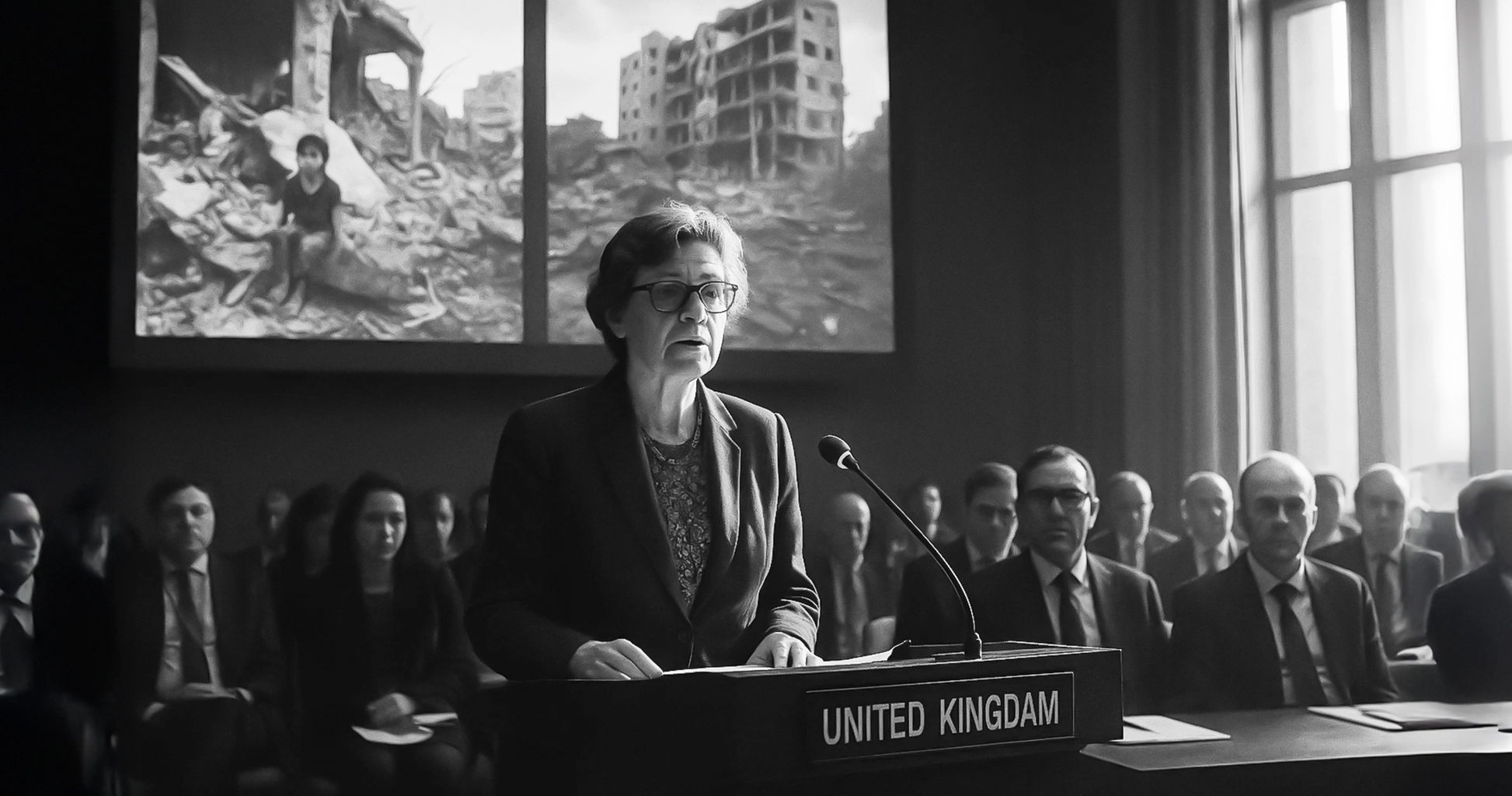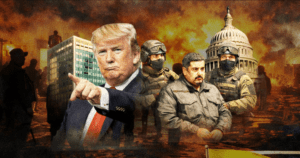As images of starving children and wounded civilians in Gaza flood international media, the United Kingdom has delivered a scathing critique of Israel’s humanitarian policies before the United Nations Security Council. UK Ambassador Barbara Woodward condemned the Israeli aid delivery system as “inhumane, ineffective, dangerous, and fueling instability”. Her statement, while couched in the language of humanitarian concern, carried deeper strategic implications. By emphasizing the lethal consequences of a fragmented and militarized aid apparatus, the UK is not merely spotlighting inefficiency, it demonstrates how Israel is causing a humanitarian crisis that undermines regional security and inflames extremism.
This rhetoric from a traditional ally suggests a redefinition of what “support” for Israel looks like in a post-October 7 diplomatic landscape. The UK’s intervention reflects a growing belief among Western governments that humanitarian aid is no longer a peripheral issue but central to evaluating the legitimacy and sustainability of Israeli policy in Gaza.
Beyond Bureaucracy: Aid as a Frontline of Conflict
Woodward’s criticism extended beyond Israel’s management of aid distribution to its overall treatment of civilian needs in conflict. She cited deliberate obstruction of humanitarian convoys and IDF gunfire near aid drop-off sites, scenes that have come to symbolize what she described as a collapse of international humanitarian norms. The disturbing implication is that the aid system itself, rather than offering relief, has become entangled with tactics of population control and deterrence.
By linking these failures to instability, the UK is also challenging the strategic logic underpinning Israel’s approach. While Tel Aviv may argue that tightly controlling aid flows prevents diversion to Hamas, the reality on the ground, where civilians die of starvation amid unused stockpiles, risks fueling the very radicalization Israel claims that it is seeking to suppress. Humanitarian dysfunction is no longer viewed as collateral damage; it is increasingly seen as a strategic liability.
Forced Displacement and West Bank Settlements: From Policy to Illegality
The UK’s critique expanded to include what it called “clear violations of international law”, referencing Israeli Defense Minister Israel Katz’s plan to forcibly relocate Palestinians to Rafah and the accelerated expansion of settlements in the West Bank. While these moves are not new, their treatment by a permanent Security Council member as legally actionable reflects a significant diplomatic escalation. Woodward’s warning that “further action” may follow if these trends continue adds weight to speculation about coordinated sanctions or legal accountability efforts among Western states.
These warnings underscore how the UK sees Israel’s domestic policies as having international consequences. Forced displacement and settlement expansion, once politically sensitive topics largely avoided by European powers, are now presented as structural threats to both the two-state solution and regional stability. By elevating these issues at the Security Council, the UK is staking a position that goes beyond critique, it is laying a legal and moral foundation for international response.
Washington’s Dilemma: Torn Between Allies and Strategy
In contrast, the United States has maintained its traditional position of unqualified diplomatic backing for Israel, recently vetoing a UN Security Council resolution demanding an immediate ceasefire due to the absence of language condemning Hamas and addressing hostage situations. Yet this stance is increasingly difficult to sustain amid growing international censure. As Washington finds itself increasingly isolated in UN debates, pressure is mounting from close allies like the UK and France to rethink the balance between military solidarity and humanitarian responsibility.
The divergence between London and Washington exposes the limits of the Trump administration’s current approach. While President Trump has reiterated strong backing for Israeli sovereignty and security priorities, the administration’s support for alternative aid mechanisms like the Gaza Humanitarian Foundation, alongside its refusal to publicly acknowledge the mounting humanitarian toll, risks alienating traditional allies. As key partners in Europe increasingly frame unrestricted humanitarian access as a benchmark of international law compliance, Washington’s silence on the matter may erode its credibility as a global standard-bearer, particularly at a time when it seeks to rally support against authoritarian actors like Russia and China.
Weaponizing Aid: The Gaza Humanitarian Foundation Under Fire
One focal point of recent controversy is the Gaza Humanitarian Foundation (GHF), a new aid initiative supported by Israel and reportedly encouraged by Washington as a more “secure and efficient” alternative to UN aid mechanisms. However, reports from Ynet and other regional outlets suggest that GHF’s operations have resulted in unsafe distribution conditions and raised alarms about accountability, with some aid drops taking place near active military zones and lacking basic coordination with local humanitarian actors.
Woodward’s emphasis on working with “trusted UN partners” appears to directly challenge the legitimacy of GHF. The UK’s position implicitly critiques a trend toward privatized, militarized aid channels that lack transparency and are more vulnerable to manipulation or misuse. With mounting civilian casualties surrounding these distribution efforts, support for GHF may soon become politically untenable, even among its architects. If the foundation continues to operate without international oversight, it could further fragment Gaza’s aid architecture and provoke broader calls for legal scrutiny.
A Two-State Future in Jeopardy
In perhaps the most strategically significant element of her remarks, Woodward warned that Israel’s withholding of more than $2.6 billion in Palestinian tax revenues was “crippling” the Palestinian Authority, thereby weakening the only plausible political alternative to Hamas in the West Bank. The UK’s position here is not simply one of financial concern but a recognition of the political vacuum such policies are accelerating, according to the UK Government website.
The logic is clear: if the PA collapses under financial pressure and political marginalization, the likelihood of Hamas or other militant actors filling the void increases dramatically. By financially and diplomatically undermining the institutions that could one day form the basis of a Palestinian state, Israel may be foreclosing the very political settlement it claims to desire. The UK’s call to restore the PA’s functionality and viability thus reflects a broader strategic thesis, namely, that security and diplomacy are interdependent, and that dismantling one undermines the other.
A Final Note: Toward a Realigned Western Consensus?
The UK’s address at the UN Security Council signals a potential reorientation of Western policy. What was once a largely unified bloc in support of Israel’s post-October 7 operations is now fractured along lines of humanitarian law, strategic patience, and long-term stability. Britain’s statement framed Gaza not just as a site of crisis, but as a crucible for the legitimacy of international norms. By tying aid, displacement, and governance together, it offers a holistic framework for understanding how current Israeli policies may be fueling, not containing, future conflict.
For the United States, the message is both cautionary and catalytic. Continued divergence from key allies could isolate Washington in multilateral forums, while deeper engagement with humanitarian reform could offer a pathway to restored leadership. As debates intensify ahead of the Paris-Riyadh donor summit, the choices made by the US and EU in the coming weeks may determine whether Gaza becomes a case study in post-conflict reconstruction, or a grim precedent for the weaponization of humanitarian aid.














